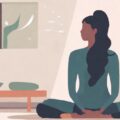Living with anxiety can be an overwhelming experience. It often feels like a relentless wave that can engulf your peace of mind at any moment. However, developing coping skills can significantly reduce the impact of anxiety on your daily life. In this article, we will explore various strategies for self-care that can help you manage anxiety effectively.
Understanding Your Anxiety
Anxiety is a natural response to stress, but when it becomes chronic or excessive, it can disrupt your life. Recognizing the triggers and patterns of your anxiety is the first step towards managing it. Keep a journal to note when your anxiety spikes and what might be causing it. This self-awareness can be crucial in developing a personalized coping strategy.
Deep Breathing Exercises
One of the simplest yet most effective techniques for managing anxiety is deep breathing. When you’re anxious, your breathing becomes shallow and rapid. By consciously slowing down your breath, you can reduce the physical symptoms of anxiety. Try the 4-7-8 technique: inhale for 4 seconds, hold for 7 seconds, and exhale for 8 seconds.
Physical Activity
Exercise is a powerful tool for anxiety management. It releases endorphins, which are natural mood lifters, and helps in reducing stress hormones. You don’t need to engage in intense workouts; even a brisk walk or gentle yoga can have significant benefits. Aim for at least 30 minutes of exercise most days of the week.
Mindfulness and Meditation
Mindfulness meditation has been shown to help people with anxiety by bringing their attention to the present moment. This practice can help you become more aware of your thoughts and feelings without becoming overwhelmed by them. Start with just a few minutes a day and increase the duration as you become more comfortable.
Healthy Eating Habits
What you eat also affects your anxiety levels. A balanced diet that includes whole grains, lean proteins, fruits, vegetables, and healthy fats can help stabilize your mood. Avoid or limit caffeine and alcohol, as they can exacerbate anxiety symptoms.
Seeking Professional Help
If your anxiety is severe or interfering with your life, seeking professional help is important. A therapist can provide you with tailored strategies and support. Cognitive-behavioral therapy (CBT) is particularly effective for treating anxiety disorders.
FAQ Section
Can anxiety be cured?
While there is no one-size-fits-all cure for anxiety, it can be effectively managed through various techniques and with the help of professionals if needed.
How does exercise help with anxiety?
Exercise helps by releasing endorphins, improving sleep, and reducing stress hormones, all of which can alleviate anxiety symptoms.
Are there any foods I should avoid to help with my anxiety?
It’s recommended to limit caffeine and alcohol as they can increase anxiety. A diet high in processed foods and sugar can also contribute to anxiety symptoms.
How often should I practice mindfulness or meditation?
Try to make it a daily practice, even if it’s just for a few minutes at a time. Consistency is key to experiencing the benefits.
What should I do if self-care isn’t enough?
If anxiety is affecting your ability to function, it’s important to seek professional help. A therapist can provide you with strategies and treatment tailored to your needs.









